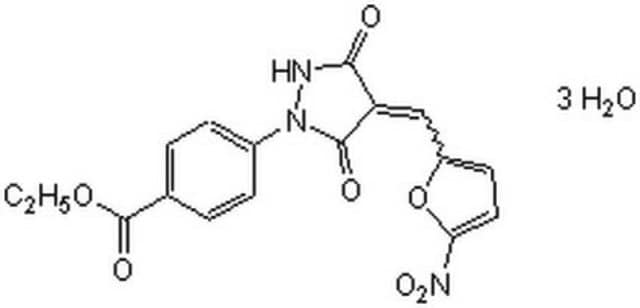N2915
PYR-41
≥98% (HPLC), powder
Synonym(s):
4[4-(5-Nitro-furan-2-ylmethylene)-3,5-dioxo-pyrazolidin-1-yl]-benzoic acid ethyl ester
About This Item
Recommended Products
Quality Level
Assay
≥98% (HPLC)
form
powder
color
red to brown
solubility
DMSO: 5 mg/mL, clear (warmed)
storage temp.
−20°C
SMILES string
CCOC(=O)c1ccc(cc1)N2NC(=O)\C(=C/c3ccc(o3)[N+]([O-])=O)C2=O
InChI
1S/C17H13N3O7/c1-2-26-17(23)10-3-5-11(6-4-10)19-16(22)13(15(21)18-19)9-12-7-8-14(27-12)20(24)25/h3-9H,2H2,1H3,(H,18,21)/b13-9+
InChI key
ARGIPZKQJGFSGQ-UKTHLTGXSA-N
Application
- to determine the cellular degradation pathways on adeno-associated viruses (AAV) transduction
- to assess its selectivity and potency by matrix assisted laser desorption/ionization-time of flight (MALDI-TOF) E2/E3 assay
- to treat fully differentiated C2C12 myotubes in high glucose medium for determining its effect on protein ubiquitination and cell viability
- in the pretreatment of human brain microvascular endothelial cells (hBMECs) for the inhibition studies before infection with bacteria
Biochem/physiol Actions
Signal Word
Warning
Hazard Statements
Precautionary Statements
Hazard Classifications
Acute Tox. 4 Oral - Skin Sens. 1
Storage Class Code
11 - Combustible Solids
WGK
WGK 3
Flash Point(F)
Not applicable
Flash Point(C)
Not applicable
Certificates of Analysis (COA)
Search for Certificates of Analysis (COA) by entering the products Lot/Batch Number. Lot and Batch Numbers can be found on a product’s label following the words ‘Lot’ or ‘Batch’.
Already Own This Product?
Find documentation for the products that you have recently purchased in the Document Library.
Customers Also Viewed
Our team of scientists has experience in all areas of research including Life Science, Material Science, Chemical Synthesis, Chromatography, Analytical and many others.
Contact Technical Service







